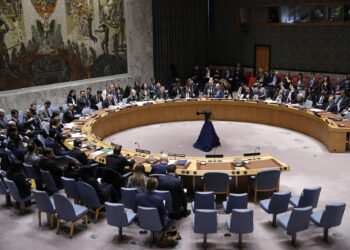Head of the Fifth Terrorism Circuit of the Cairo Criminal Court
Judge Mohammed Saeed el-Sherbiny participated in the Egyptian authorities' crushing of independent voices by keeping opposition figures in extended pretrial detention, as part of a campaign to intimidate them into silence.
El-Sherbiny has presided over the trials of numerous dissidents, prosecuted for their peaceful speech, expression, and association or political activism in general. He used vaguely worded and overly broad "anti-terrorism" laws to keep these peaceful activists in extended and unlawful pretrial detention.
"El-Sherbiny used pretrial detention as punishment itself, throwing peaceful activists into jail to silence their voices in Egypt," said Sarah Leah Whitson, executive director of DAWN. "Why bother bringing evidence when he can simply jail them without trial?"
El-Sherbiny repeatedly extended the pretrial detentions of political detainees Haitham Mohamedain and Khaled Dawoud. Mohamedain is a labor activist and human rights lawyer who advocates for independent and worker-led trade unions. He has organized and led numerous social justice and democracy protests throughout Egypt. Dawoud has consistently been a strong voice in support of democracy and human rights in Egypt. He opposed military rule during his tenure as a leader of al-Dostour party between March 17, 2017 and May 13, 2018. No evidence was presented to establish any of the statutory conditions for pre-trial detention as stipulated in Article 134 of Egypt's Code of Criminal Procedure.
El-Sherbiny ordered these detainees to remain in pretrial detention without providing reasons for his decision, as required by Egyptian domestic law and international standards of due process. In some instances, el-Sherbiny extended pretrial detention without giving the detainees or their lawyers a meaningful chance to be present and make arguments, in violation of Egyptian domestic law and international human rights law.
In the case of Mohamedain, el-Sherbiny extended his pre-trial detention on July 25, 2020, without giving him a chance to be present and make arguments, in violation of Articles 143 of Egypt's Code of Criminal Procedure and international human rights law.
Additionally, on January 15, 2023, el-Sherbiny issued an arbitrary mass sentence of 82 people, including 22 minors, over their engagement in peaceful protests. Of the 82 people it sentenced, it gave 38 life sentences and 44 others, including 22 children, sentences ranging from five to 15 years. Of the 38 who were handed life sentences, 23 were tried in absentia, including exiled businessman and actor Mohammad Ali.
These sentences were part of a broader mass trial of 103 people in a case known in local media as "The Joker" due to protesters wearing face masks resembling the ones worn in the American movie "Joker." The mass trial targeted individuals who supported or participated in the widespread protests throughout Egypt in 2019 against President El-Sisi, ultimately resulting in over 4,000 arrests. The protests coincided with a call by exiled Egyptian businessman and actor Mohammad Ali for demonstrations to demand El-Sisi's resignation. Smaller demonstrations were also held in the United States and Canada against Egypt's president.
The court's charges against the sentenced defendants varied, including participation in the protests; posting videos on YouTube, Facebook, and other media platforms; and encouraging and documenting the mobilization. Other charges alleged that protesters were responsible for "disrupting transportation" and using "force and violence against public officials."
Judge el-Sherbiny delivered the mass sentences on the apparent basis of collective guilt. Prosecutors did not present evidence of individual criminal culpability against any of the defendants, according to a DAWN interview on January 30, 2023, with a lawyer representing several of those accused. The lawyer, who was present at the hearings, said that prosecutors also presented no evidence linking those sentenced to engaging in violent activities, disrupting transportation, or damaging public or private property. The allegations of the court regarding defendants encouraging violence directly contradict, for example, video statements issued by Mohammad Ali calling for protests and explicitly discouraging violence. Additionally, ample video documentation of the protests show protesters demonstrating peacefully and then being attacked by security forces. Some of those sentenced had no links to the demonstrations at all and appear to have been arrested for voicing criticism of El-Sisi online prior to the protests.
The trial also marked any semblance of basic due process. Egyptian authorities did not present many of those sentenced with arrest warrants or any other legal explanation for their arrests, and prevented lawyers from communicating with the defendants or viewing relevant case papers. Additionally, security forces broken into and searched the homes of a number of those detained without a judicial warrant. Several of those sentenced reported instances of torture to the lawyer interviewed by DAWN, showing him the physical injuries on their bodies suffered from being abused, he said. As a result of the state of emergency within Egypt and the convictions being delivered in a terrorism court, defendants cannot appeal these sentences.
El-Sherbiny graduated with a Bachelor of Law from Mansoura University in Egypt's Delta. His most famous decisions as Head of Port Said Criminal Court and as Head of Fifth Terrorism Circuit of the Cairo Criminal Court were those imposing death sentences on eleven defendants in the case of Port Said Stadium Massacre in June 2015, seven defendants in the case of Helwan Microbus in November 2019 and two defendants in the case of Mar Mina Church in May 2019.
On September 23, 2020, DAWN requested a response from el-Sherbiny by writing to the Egyptian government, but no response has been received as of publication.
Tell el-Sherbiny to stop abusing the due process rights of peaceful activists. Write to him at the Egyptian Judges Club on Facebook, or the Egyptian Ministry of Justice on Twitter.
Watch the video of el-Sherbiny here.
About DAWN's culprit gallery:
Tyrants need enablers who will implement their oppressive practices, even if it means abusing their fellow citizens. These agents often mask their complicity in the guise of professionals exercising their duties in offices, courtrooms, police stations, and interrogation rooms.
DAWN seeks to disclose the identity of the state agents who enable repression and to make them recognizable at home and abroad. These individuals, whom DAWN calls "culprits," bear administrative, civil, moral, legal, and/or political responsibility for human rights and international humanitarian law violations.





































